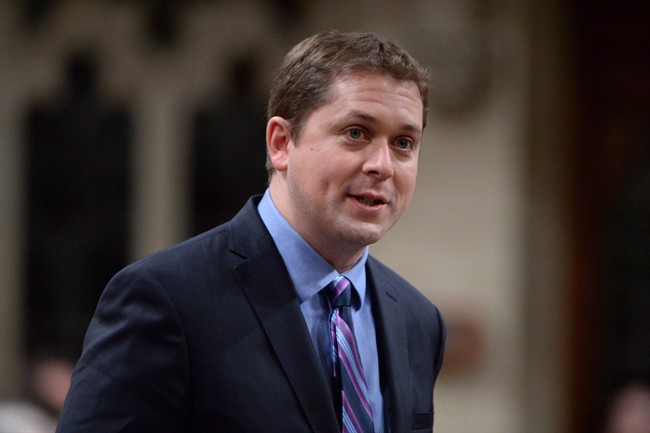Conservative Leader Andrew Scheer says Canadians have every right to be concerned that immediately extending health and other social benefits to newly arrived asylum seekers will strain the system.

In an interview with Global’s Vassy Kapelos on Thursday morning, Scheer said the influx of would-be asylum claimants in Quebec and Manitoba in recent months is a sustained “crisis” with many facets.
Because of the number of people crossing illegally on a daily basis, the government has seen a backlog develop in the system. While security checks are being completed almost right away, it may now take months for officials to decide whether someone is actually eligible to make a claim — a process that used to take just hours or days.
READ MORE: Quebec preparing to dole out welfare cheques to asylum seekers
As a result, border-crossers are being granted access to Canadian health care and other benefits immediately, something that typically only happens once their eligibility is confirmed.
“Canadians are rightly bothered … they’re rightly concerned at what that means for their access to health care, for their wait times,” Scheer noted.
Still, he said, Canada’s whole system is predicated on making sure people have access to “the fundamental basics while they’re here.” Prime Minister Justin Trudeau and his cabinet need to think about that as they decide what to do next, he added.
“I think that that has to be considered as part of the overall discussion, that this is not just a massive strain on our immigration and refugee resources, but it is going to put serious burdens on our social assistance programs.”
The Liberals have acknowledged the rapid upswing in asylum seekers crossing the border illegally this spring and summer — many of whom are from Haiti — but say the situation is under control and that there have been a number of big influxes in the past.
The government is also making efforts to communicate to people in the United States that there is no advantage to crossing the border away from a designated entry point.
“Just because the prime minister says something doesn’t make it so,” Scheer responded on Thursday. “The advantage is that people are now in Canada and they have all the access of the system. So clearly the people coming across the border feel that there’s an advantage.”
READ MORE: Quebec prepares schools for influx of asylum seekers entering education system
- Trudeau tight-lipped on potential U.S. TikTok ban as key bill passes
- Canadian man dies during Texas Ironman event. His widow wants answers as to why
- Hundreds mourn 16-year-old Halifax homicide victim: ‘The youth are feeling it’
- On the ‘frontline’: Toronto-area residents hiring security firms to fight auto theft
The asylum seekers are, in fact, taking advantage of a loophole in the Safe Third Country Agreement between the two nations. The agreement forces Canadian officials to turn back most people who arrive at legal border crossings seeking asylum, because they have already landed in the U.S. and can file a claim there.
But people who cross away from a legal checkpoint are immediately arrested by the RCMP, and can then make an asylum claim regardless of the fact that they were in the U.S. first.
Scheer said Trudeau has been trying to adapt to the illegal crossings rather than addressing the root cause.
“He has a variety of options,” the Conservative leader noted.
According to Scheer, those include expanding the Safe Third Country Agreement to the entire border after consulting with the U.S. government. Scheer said Canada could also designate Lacolle, Que., and Emerson, Man. (the most popular illegal crossings) as official ports of entry so that the rules around what happens at a traditional border crossing would apply.
“Conservatives were warning the government back in January that once the winter was over the flow would increase as people found it easier to cross,” Scheer added.
“That’s exactly what happened, and nothing has been done … When (the House of Commons) comes back in the fall, we’re going to be asking some very, very serious questions.”













Comments